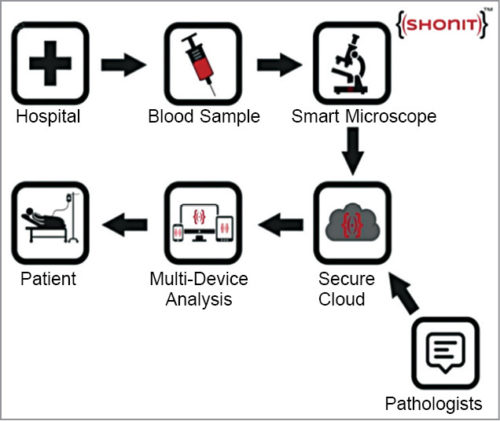Taking blood tests is the first step in evaluating and detecting diseases, ranging from viral fever to parasitic illnesses like malaria and dengue, and complicated diseases like blood cancer and HIV. Pathology labs in India are always on their toes because of the high volume of test samples collected daily. Performing morphological and quantitative tests, generating reports and delivering these on time often becomes challenging. At times, the rush leads to inaccurate reports, which can be life-threatening. Bengaluru-based startup SigTuple took to technology to solve this crisis.
In many semi-urban, rural and some urban areas, medical centres lack proper pathological test facilities or skilled pathologists, and have to call nearby hospitals or laboratories to conduct tests on patients. In some cases, hospitals are far as well. All this results in hours of delay in treatment. Moreover, manual processes of setting the test smear in a microscope at different positions to perform proper analysis is time-consuming and, at times, erroneous.
Founded by Rohit Kumar Pandey, Tathagato Rai Dastidar and Apurv Anand, SigTuple offers a complete AI-powered hardware and software platform, called Shonit, to automate sample analyses and derive reports remotely. The aim of the solution is to reduce turnaround time for report generation and enable doctors to start early diagnosis.

How Shonit works
Shonit is an automated screening platform for test samples that uses technologies like image processing, cloud-based analytics and AI. Blood drawn from patients is smeared on test slides and brought under a smart microscope designed by SigTuple. It is essentially a light microscope with a cellphone-based camera fitted on the eyepiece.
There is automated rendition of the microscope, too, where the stage is positioned automatically during image capture. Clear, amplified images of the smear are captured through this camera and sent to SigTuple’s proprietary AI-powered cloud platform.
The AI platform is called Manthana. It automates the process of sample annotations. And through image analytics and deep learning algorithms, it creates detailed blood reports.
Apart from providing accurate parameter-based evaluation, like RBC count, WBC count, platelet count and others, it also suggests possible diseases, infections and conditions the patient might be suffering from.
In addition, it delivers proper images of all cells accounted for, which is essential for morphological verification. This enables the pathologist or the doctor to verify the reports using any Web-connected device like a smartphone or tablet, without being co-located with the microscope used for the test. Essentially, a test facility can send the reports to a remote hospital immediately to start preparing for medication without further delay.
Turnaround time for each report is less than 10 minutes. These tests can also be run for other biological samples such as urine and semen. The platform is offered in a pay-per-use business model.
One of the major challenges for SigTuple in creating the solution was finding a way to digitise test samples.
Spreading awareness about the solution was also a major task.
SigTuple has tied up with medical institutions and experts from the medical and biotechnology industry to produce their solutions. Shonit has undergone three clinical validations and experienced multiple deployments in medical facilities with positive feedback. The technology eventually aims to reduce stress on pathological laboratories and cost of tests for individuals.
SigTuple is working on more solutions: Shrava for urine analysis and Aadi for semen analysis, both of which are under process clinical validation. Two more solutions, Dhrishti for retinal scan analysis and Vaksha for chest X-ray analysis, are under developmental phases.









how can blood sample can detect any type disease and what time takes device.
please given information how can design .it is very good project.can u help me sir/madam.